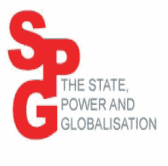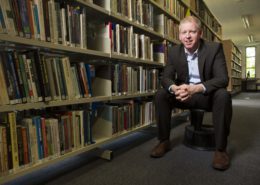The State Power & Globalisation

The Research Centre for the Study of the State, Power and Globalisation (SPG) seeks to promote the study of the most predominant political questions of our time. The cluster seeks to organise and form links between researchers across and beyond Richmond University engaged in the analysis of the historical and ongoing transformation of political agents and structures at the level of the state and of international politics and seeks to understand the complex intersections and interplay between local and state power and the forces of globalisation.
The cluster functions as a platform to connect and form links between research across disciplines in such diverse areas as contemporary social, political, and international theory, ideology, social movements; global conflict and governance; and global political economy and development. The research cluster reflects the scholarly and pedagogical aims of Richmond University’s taught degree programmes in Political Science, International Relations, International and Development Economics, Communications, and History. In particular, the cluster’s research area reflects the aims of the MA International Relations.
The Research Centre for the Study of the State, Power and Globalisation (SPG) is led by Dr. Kandida Purnell.
Recent publications
Danilova, N. and Purnell, K.(2019), ‘The museumification of the Scottish soldier and the Meaning-making of Britain’s Wars’, Critical Military Studies, Online First.
Rekret, P. (2019), ‘Cogito Ergo Habo: Philosophy, Money, and Method’ in Camille Barbagallo, Nicholas Beuret, & David Harvie (eds) Silvia Federici & George Caffentzis, Pluto Press.
Rekret, P. (2019) ‘Jacques Derrida and Deconstruction’, in Jeremy Jennings (Ed.), The Cambridge History of French Thought, Cambridge: Cambridge University Press.
Brown. M, & Romano, A. (2018), ‘Executors or creative deal-makers? The role of the diplomats in the making of the Helsinki CSCE’, in S. B. Snyder & N. Badalassi (eds.), The CSCE and the End of the Cold War. Diplomacy, Societies and Human Rights, 1975-1990, Berghahn Books, New York, pp. 43-73.
Brown, M (2018), ‘The Czechoslovak Government-in-Exile and the Legacy of Population Transfers: An Analysis of the English Language Discourse’, in V. Smetana & K. Geaney (eds.), Exile in London: The Experience of Czechoslovakia and the Other Occupied Nations, 1939-45, University of Chicago Press, Chicago, pp. 167-190.
Rekret, P. (2019) ‘Seeing Like a Cyborg? The Innocence of Posthuman Knowledge’ in Christian Fuchs & David Chandler (eds.), Digial Objects/Digital Subjects: Interdisciplinary Perspectives on Big Data Capitalism, London: Westminster University Press.
Soborski, R. (2019) ‘Prefigurative Politics in Anti-Neoliberal Activism: A Critique’. Perspectives on Global Development and Technology Volume 18, Issue 1-2,79-92.
Jerónimo Kersh, D. (2019) Women’s Work in Special Period Cuba: Making Ends Meet, New York, Palgrave Macmillan.
Jerónimo Kersh, D. (2018) ‘Returning to Pre-Revolutionary Divisions of Labor: Women’s Informal Employment during Cuba’s Post-Soviet “Special Period” Economic Crisis 1990-2005’, Latin American Perspectives, Vol: 45, issue: 1, pp. 175-194.
Rekret, P. (2018) Derrida and Foucault: Philosophy, Politics, Polemics, (‘Reframing the Boundaries: Thinking the Political’ series) London & New York: Rowman & Littlefield.
Soborski, R. (2018) Ideology and the Future of Social Movements, London & New York: Rowman and Littlefield.
Boys, J. (2018) Clinton’s War On Terror: Prelude to Catastrophe 1993 -2001, Colorado: Lynne Rienner.
Keating, M.F., A. Goldthau and C. Kuzemko (2018) (eds.) The Handbook of the IPE of Energy and Resources, Edward Elgar.
Rekret, P. (2018), ‘The Head, the Hand and Matter: New Materialisms and the Politics of Knowledge’, Theory, Culture & Society 35(7-8): 49-72.
Rekret, P. (2018) ‘Posthumanism’s Tabula Rasa: On Theory, Innocence, and Consumption’, in Research in Education: Policy, Theory and Practice 101(1): 25-29.
Taylor, I. (2017) Media Relations of the Anti-War Movement: The Battle for Hearts and Minds, London: Routledge.
Wylde, C. 2017. Emerging Markets and the State: Post-neoliberal Regimes in Latin America and Asia (London: Springer).
Soborski, R. (2017) ‘Ideological imbalance following the credit crunch: neoliberalism versus the politics of resistance’. In J. Smith et al. (eds) Social Movements and World-System Transformation. Routledge, 94–111.
Flood, C. and Soborski, R. (2017) ‘Euroscepticism as ideology’. In B. Leruth, N. Startin and S. Usherwood (eds) Routledge Handbook of Euroscepticism. Routledge, 36–47.
Brown, M. (2017) ‘The missing ‘human dimension’ of the Final Act of the Conference on Security and Cooperation in Europe (CSCE), 1975’, Diplomaatia, No. 171, November 2017.
Alessio, D., P. Olle & K. Arnold (2017) “Spain, Germany and the United States in the Marshall Islands: Re-imagining the imperial in the Pacific” Journal of New Zealand & Pacific Studies 4, 2:115-136.
Rekret, P. (2017) Down With Childhood: Pop Music and the Crisis of Innocence, London: Repeater Books.
Rekret, P. (2017) “The Sovereignty of Sovereignty and the Restricted Object of Critical IR” in Bronwyn Winter & Lucia Sorbera (eds), Contending Legitimacy in World Politics: the State, Civil Society and the International Sphere in the Twenty-First Century, London: Routledge.
Rekret, P, (2017) “Working Holiday: On Labour and Leisure in Trap”, Cesura//Acceso: Journal for Music Politics and Poetics.
SPG Membership
Events
The State Power & Globalisation past events
2021
Spring 2021 Events
‘Rethinking the Body in Global Politics’
Kandida Purnell’s book launch, Wednesday April 14
A roundtable discussion of Richmond Assistant Professor of International Politics, Kandida Purnell’s new book, published with Routledge. With Jessica Auchter (U of Tennessee), Marysia Zalewski (Cardiff), Tom Gregory (Auckland), and Lauren Wilcox (Cambridge).
‘When is a justice campaign over? Transitional justice, ‘overing’ and Bloody Sunday’
Tom Bentley (Aberdeen), 12th April 2021
This article explores the political, strategic and emotional issue of victim groups deciding to continue or discontinue central components of a justice campaign in the aftermath of receiving ‘truth’. Drawing on in-depth interviews, the article focuses on relatives and other stakeholders’ varying positions on (dis)continuing the annual Bloody Sunday commemoration march after the publication of the Report of the Bloody Sunday Inquiry and the UK Prime Minister’s apology for the massacre.
‘Debt and the woman: Pondering extractive relationships that trouble women entrepreneurs in Sri Lanka’s post-war economy’
Anupama Ranawana (Christian Aid/University of Roehampton), 19th April 2021
This lecture applying a feminist and decolonial lens, wonders at new ways to reflect about and beyond this ‘crisis, and thus challenge epistemic and ethical boundaries. In particular, the paper reflects on what is further obscured or silenced- such as caste, gender and religion- within these extractive relationships.
‘The Ideological History of Fascism’
Matthew Feldman, Wednesday April 7
Professor Matthew Feldman is a specialist on fascist ideology and the far-right in Europe and the USA. He has written widely on these subjects, for both academic and general audiences. He has long researched the interaction between politics and faith in the modern world, and has taught these subjects for some two decades to school, undergraduate and postgraduate students. An Emeritus Professor in the History of Modern Ideas at Teesside University, in 2013 Prof. Feldman led Britain’s first unit dedicated to analysis of radical right extremism, the Centre for Fascist, Anti-fascist and Post-fascist Studies (CFAPS), and prior to that, directed the Radicalism and New Media Group at the University of Northampton. He is a Visiting Professor at Richmond, the American University in London, having previously held fellowships at the universities of Bergen (Norway), Birmingham and Oxford (thrice). He is an editor of Wiley-Blackwell’s online journal, Compass: Modern Ideologies and Faith, and co-edits two academic book series Bloomsbury Publishers, Modernist Archives and Historicizing Modernism.
The story of fascism, or rather its birth after WWI, is familiar enough from documentaries and books on the Axis. But that is only part of the story. The nationalist regimes in Italy and Germany can also distort our understanding of fascism. Seen from a centennial perspective, namely that of Mussolini, the first Fascist who successfully marched on Rome in October 1922 and then unveiled totalitarian rule in Italy in 1925, fascism today looks less like history than current affairs. But is it? This talk tries to address these questions by telling a narrative history of fascist ideology.
‘Equality, diversity and inclusion? International volunteering for development in Africa’
Angela Haynes, April 6
Angela Haynes worked in the international development sector for over 25 years in a range of NGOs and is currently based in the Department of Development Studies at the School of Oriental and African Studies (SOAS). There she manages an international research project and is an Associate Tutor.
This talk focuses on her doctoral research, which looks at international volunteering in Africa. She discusses her question, findings, positionality and some of the issues she encountered during the course of looking at professionals of African heritage who travel to Africa to provide free healthcare and thus ‘give back’.
‘Tackling Hate in the Homeland: US Radical Right Counter-Narratives in a time of Renewed Threat’
William Alchorn, Wednesday February 24th
Dr William Allchorn is a Postdoctoral Researcher at the University of Leeds and Associate Director at the Centre for the Analysis of the Radical Right. He is an expert on anti-Islamic radical right social movements in the UK. His book, Anti-Islamic Protest in the UK: Policy Responses to the Far Right is published by Routledge. As of August 2020, he has started a new research project, testing violent radical-right extremist narratives and counter-narratives globally. His forthcoming book based on the project, Moving beyond Islamist Extremism – Assessing Counter Narrative Responses to the Global Far Right, is under contract with Ibidem (an imprint of Columbia University Press) and is due for release in Autumn 2021.
This paper gets under the currents of key US radical right extremist groups and their anti-government narratives that they propagate now. Using case study examples, the paper suggests ways forward in tackling US-based radical right violent extremist narratives, concluding with recommendations for security practitioners and policymakers in the Biden administration interested in countering radical right-inspired violence. It is argued that only a mixture of upstream (i.e. counter extremist initiatives aimed directly at individuals in the process of radicalisation) and downstream initiatives (i.e. using trusted individuals and informal civil-society actors to further embed broader-based societal counter-narratives), that the United States will do better in inhibiting the spread of violence within the radical right extremist scene and inoculate citizens from engaging in such activism in the first place.
2020
Fall 2020 Events
‘Decolonising Political Theory’
Simon Choat, Monday November 30th
Simon Choat is Lecturer in Politics and International Relations at Kingston University. He is the author of Marx Through Poststructuralism: Lyotard, Derrida, Foucault, Deleuze (Continuum 2010) and Marx’s Grundrisse: A Reader’s Guide (Bloomsbury 2016). He is currently co-editing a volume entitled Decolonising Political Theory (Oxford University Press).
Drawing on original research of political theory modules at 92 UK universities, Simon Choat shows that non-white thinkers and discussions of colonialism and race are marginalised and neglected within the teaching of political theory. Choat argues that there are intellectual, political, and pedagogical reasons why this neglect is problematic and should be reversed.
‘The Crisis in Papua’
Connor Woodman, Wednesday November 13th
Connor Woodman is a writer and former Research Fellow at the Centre for Crime and Justice Studies. He currently provides technical assistance to the United Liberation Movement for West PapSaveua.
‘US Elections 2020: Examining the Stakes’
Friday November 6th
Dr. Ronald J. Ranieri from US Army War College & Dr. Johannes Thimm (Stiftung Wissenschaft und Politik) come to the Research Centre to discuss the upcoming US Presidential elections and their global significance.
‘Thinking Aloud the World After Covid-19’
Tuesday October 13
Join Richmond faculty from across a range of disciplines as they examine the potential long-term effects of the ongoing coronavirus pandemic. Talks will include Dr. Kandida Purnell, ‘The Body Politics in a Time of Pandemic’; Dr. Nick Ferguson, ‘After The Airport City’ and Dr. Eunice Goes, ‘Another World is Possible?’
2019
Fall 2019
‘Competitive Political Victimhood: Exploring the Relationship Between Righteousness and Insecurity’
Noga Glucksam, Wednesday September 25th, 6.00pm 216 Asa Briggs Hall
‘Moving beyond Islamist Extremism: Counter Narrative Responses to the Far Right’
William Alchorn, October 2nd, 6.00pm, 216 Asa Briggs Hall
Will Alchorn is Associate Director of the Center for the Analysis of the Radical Right and Research Fellow at University of Leeds.
‘’Violent Non-State Actors and the Quest for Territory’
Caroline Varin, October 9th, 3pm, 108 Asa Briggs Hall
Caroline Varin is Lecturer in Security and International Organizations at Regent’s University London and Research Fellow at the London School of Economics and Political Science, UK. She will be discussing her recently volume Violent Non-State Actors in Africa: Terrorists, Rebels, and Warlords (Palgrave, 2017).
‘Positive Women, Heartache Hope and Living With HIV – Film Screening and Lecture’
Anne Lotter, 9 Oct 6pm, Briggs Café, Asa Briggs Hall
Anne Lotter is an Assistant Professor at Richmond and Fellow of the Royal Anthropological Institute
Filmmaker Bex Devaraj and anthropologist Anne Lotter were given unique access to one of the biggest slums in Kampala, Uganda, where every day is a struggle for survival. In this intimate film, six courageous women share their stories of heartache, hope and living with HIV.
(Joint IVAC event with SPG Research Centre)
‘The Crisis in West Papua’
Connor Woodman, November 13, 9.00am, 108 Asa Briggs Hall
Connor Woodman is a writer and former Research Fellow at the Centre for Crime and Justice Studies. He currently provides technical assistance to the United Liberation Movement for West Papua.
‘The First World as Imperial Conflict’
Zapryan Dumbalski, November 20, 9.00am, 108 Asa Briggs Hall
Zapryan Dumbalski is an independent researcher with extensive experience in the history of the First World War. His research interests also include Central and East European history, collective and cultural memory, the history of the Gulag, war memorials and remembrance, and poetry, in particular war poetry. He is currently working on an anthology of European poetry.
Spring 2019
‘The European Union as a System of Governance’
Dr Maxine David, Leiden University
‘Talking About Human Rights: An Introduction to the Sociology of Human Rights’
Dr Darren J. O’Byrne, University of Roehampton
‘Gender Socialization and Oppression’
Dr Roberta Guerrina, University of Surrey
‘The Great Escape: The Discursive Construction of Brexit and Global Britain’
Dr. Oliver Daddow, University of Nottingham, Bennett Institute University of Cambridge. March 20, 2019.
‘The European Union Strategy for International Cultural Relations: Framworks and Tensions’
Mafalda Damaso, February 20, 2019.
‘Learning from the Field: Conflict Resolution Praxis and Development’
Dr. David Bremner, Independent conflict resolution and transformation expert. February 14, 2019.
‘International Planned Parenthood Federation (IPPF)’
Snježana Bokulić, Director, Performance Division, January 2019.
‘Policing the Arab Carceral City’
Bruce Stanley & Hattie Field, Richmond University, January 23, 2019.
2018
Fall 2018
‘Crisis and Polarisation in Latin America’
Jeff Webber, Queen Mary University of London, October 1, 2018.
‘Climate Change as Security Issue’
Caroline Varin, Professors Without Borders, 17 October, 2018.
‘Fortress Europe: The Historical Origins of the European Frontier’
Luke Cooper, Anglia Ruskin University, October 30, 2018.
‘Ukrainian Foreign Policy: Reality and Perspectives’
Hon. Mrs. Natalia Galibarenko, Ukrainian Ambassador to the United Kingdom, November 14, 2018.
‘How England’s Merchants Founded America And Launched The British Empire Before The Pilgrims’
Dr. Simon Targett, November 28, 2018.
Spring 2018
‘New Books in Politics with Michael Keating, Rafal Soborski, and Paul Rekret’
February 14, 2018.
‘Cyber and Political Risk’
Khaled Fattal, March 13, 2018.
2017
Fall 2017 SPG Seminar Series
Fantasy Apocalypse
A One-Day Joint Symposium of all things Science Fiction, fantasy and horror with The University of Northampton and Richmond University
‘Diego Garcia: What, How, Where Now?’
Allen Vincatassin, President of the Provisional Government of Diego Garcia & Chagos Islands, November 30, 2017.
‘Brexit: Why Britain Voted to Leave the EU’
Dr. Eunice Goes (Richmond), November 23rd, 2017.
‘America First or America Alone? Trump on collision course with China’
Prof. Wolfgang Deckers (Richmond), 15 November 2017.
‘Virtual Warfare: 21st Century Warfare
Daniel Wagner (CEO Country Risk Solutions), 29 November, 2017.
‘Emerging Markets and the State: Developmentalism in the 21st Century’
Dr. Chris Wylde (Richmond), 28 November, 2017.
‘Why (and How) International Commercial Law Matters to International Political Economy’
Dr. Edward S. Cohen (Westminster College), 12 October 2017.
‘US Presidential Election 2016: What Happened’
Dr. James Boys (Richmond), October 2017.
Spring 2017 SPG Seminar Series
‘English Uprising: Brexit and the Right-Wing Revolt’
Dr. Paul Stocker (Richmond), 12th April.
‘The Armature of Sumud: Gaza’s Network of Resilience’
Prof Bruce Stanley, (Richmond), March 2, 2017.
‘US-UK Special Relations’
Mr Lew Lukens (Chargé d’Affaires ad interim, U.S. Embassy in London), 18 February 2017










